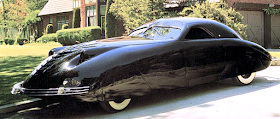A series of prototypes were built, details edging towards the first production model, the Saab 92 that reached the Swedish market in 1950.
Below are images of that car and another prototype along with two earlier cars with similar rear styling details. Because Saab built aircraft and had a wind tunnel, it is no surprise that the new car was tested to enhance aerodynamic efficiency. Whether or not the other streamlined examples actually influenced Saab designers is belong the scope of my source materials. That said, I hope you might find the similarities interesting.
The UrSaab. There are no wheel openings. The hood has "boat tail" sculpting on the part covering the high parts of the motor.
Lower level view of the front.
A later prototype featuring wheel opening spats similar to those on production cars. The visual feeling is "teardrop" -- a common automobile aerodynamic solution of pre- World War 2 days.
Rear quarter view of the UrSaab in motion. The plan view of the passenger compartment has the "boat tail" treatment.
Rear quarter view of the Phantom Corsair, a solitary concept car of 1938. Although some details differ, it and the UrSaab are conceptually the same from this perspective.
The is a Tatra 97, marketed 1936-1939. Unlike the UrSaab and Phantom Corsair, its engine was mounted in the rear. It too has something of a passenger compartment boat tail. The same was true of production Volkswagen beetles.
The front of the Phantom Corsair differed greatly from the UrSaab, which was a much smaller car.
The same can be said for the Tatra 97.
As it happened, production Saab 92s had a different rear end shape than those of the first prototype. The boat tail plan view was abandoned, perhaps to simplify production or perhaps because more trunk space was desired. The rear window is now one-piece, but it's mounted so low that I wonder how good rear vision was for Saab drivers. This is a 1952 model.









Saab assembly and testing in 1960. Model 96 by then, I think, but still basically similar and with the 2 cycle engine. I think the guys in the paint shop are using breathing protection a bit under modern standards, and for some reason some assembly line guys are wearing street clothes. Odd low frame rate, but worth a few minutes.
ReplyDeletehttps://www.youtube.com/watch?v=c9E-iriAjaQ&feature=emb_logo